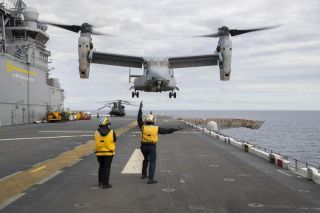Psychopharmacology
Can Pilots Fly While Taking Psychiatric Medication?
The military and the FAA permit this to some extent.
Posted March 13, 2023 Reviewed by Michelle Quirk
Key points
- Psychotropic medication is an important part of the treatment plans for some aviation personnel with mental health disorders.
- Each aeromedical certificating agency has adopted differing guidance, based on their unique missions and medical policies.
- With caveats, aviation personnel in the United States, are now able to fly on some psychotropic medications for some conditions.
Psychotropic medication is an important part of the treatment plans for some aviation personnel with mental health disorders. However, in the aviation population, medication use is highly regulated, with many classes of medications considered unsafe in the aviation environment (as an example, see the Federal Aviation Administration’s [FAA's] list of “no fly” medications).

However, both the FAA and the U.S. military realized the problems associated with not considering flight status for those whose mental health symptoms were or could be successfully and safely managed with some classes of psychotropic medications. Chief among these concerns was that aviators with depressive symptoms had a high risk of flying impaired so as not to be grounded, or of seeking treatment and taking medications without the knowledge of their aviation medical examiner (AME) or flight surgeon.
Consequently, these concerns, combined with the efficacy of some modern medications and their generally safe side-effect profiles, prompted both the FAA and the U.S. military to begin to consider the use of antidepressants in the early 2000s. It is notable that each aeromedical certificating agency has adopted differing guidance, based on their unique missions and medical policies.
Differing Policies by Agency
The Army was first to permit the use of some psychotropic medications in the military aviation population in 2004. Currently, the Army will consider permitting individuals who have achieved full symptom relief and who have no side effects to fly on psychotropic medications for anxiety, obsessive-compulsive, trauma/stress-related, and mood disorders. Some specific medication classes are not considered, including (but not limited to) antipsychotic agents; barbiturates; mood ameliorating, tranquilizing, or ataraxic drugs; Drug Enforcement Administration (DEA)-scheduled medications; and hypnotics (U.S. Army, 2021). Note that each consideration is made on a case-by-case basis, and there is a differentiation made between certain types of Army aviation personnel (e.g., applicants versus designated personnel) as it relates to exceptions to policy.
The FAA began to consider allowing treatment with one of four selective serotonin reuptake inhibitors (SSRIs)—fluoxetine, sertraline, citalopram, and escitalopram—in 2010. The FAA considers issuance of medical certificates for airmen (i.e., pilots) and air traffic controllers with depressive disorder diagnoses or other mental health conditions that may be treated by one of the aforementioned SSRIs. The FAA’s guide for AMEs regarding medical certificates for use of antidepressants may be found here.
The Air Force was next in 2013, permitting consideration of waivers for limited types of personnel with flight status. In 2018, the Service expanded its program, permitting waivers for all flight personnel, including pilots of single-seat aircraft. Monotherapy use of sertraline, citalopram, escitalopram, and bupropion for the treatment of certain depressive, anxiety, and trauma/stress-related disorders may be waived (U.S. Air Force, 2022). Waivers for the use of psychotropic medication are generally considered only for trained personnel, not for untrained individuals.
The Navy, Marine Corps, and Coast Guard (all of whom essentially use the same medical and waiver standards) were the most cautious and were the last to permit waivers (2018). This was due in part to the fact that aviators in these seagoing Services, unlike Army, Air Force, or General Aviation flyers, land aircraft on ships, a practice jokingly described by Naval Aviators as akin to landing on a moving postage stamp. These Services waive psychotropic medication use for already-trained personnel (but not applicants) being treated for depressive, anxiety, obsessive-compulsive, and trauma and stress-related disorders. The Navy/Marine Corps/Coast Guard will consider any FDA-approved medication, as long as it is not restricted by the Aeromedical Reference and Waiver Guide and does not cause side effects that impact flight safety (e.g., cognitive side effects). To date, waivers have been granted for the use of SSRIs, NDRIs (norepinephrine-dopamine reuptake inhibitors), and SNRIs (serotonin-norepinephrine reuptake inhibitors).
Summary
To summarize, aviation personnel in the United States, with variable caveats depending on the certificating agency, are now able to fly on some psychotropic medications for some conditions. This has expanded treatment options for aviation personnel, a win–win for agencies and flyers alike.
References
U.S. Air Force (September 2022). Aerospace Medicine Waiver Guide.
U.S. Army Aeromedical Activity (December 2021). Aeromedical Policy Letters and Aeromedical Technical Bulletins.


